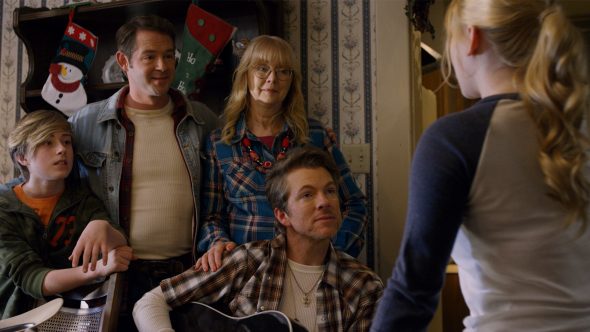Christmas Grace (2013)
available on Tubi, whatever that is
By Matthew Belinkie
The first rule of mainstream Christmas movies is, “Don’t use the J-word.” Christmas is to be presented as a completely secular holiday. Sure, in It’s a Wonderful Life we get the angels, but they are more Disney fairy godmother than New Testament. There’s the scene in Home Alone where Kevin goes to church and listens to a children’s choir singing “O Holy Night,” but nobody prays (except maybe Harry and Marv, for the sweet release of death).
Of course, there’s a whole other genre of Christmas movie, in which Santa is nowhere to be found but God is front and center. And I sat through one in bewildered fascination.

Christmas Grace introduces us to Gary, a baby-faced toy store owner who goes to church every other scene and has bible verses stenciled onto the walls of his condo. Enter Mr. Tollman, the kind of man who always wears a tie, has no first name, and screams at the carolers outside his office window. He’s opening up a larger, more corporate toy store right across the street, and he promises Gary he’s going to put him out of business. In case you weren’t sure who to root for, Tollman pays a delivery man to lose Gary’s shipments right before Christmas.
So 23 minutes into the movie, Gary is unemployed with a brand new baby and I’m honestly curious where this is going. That’s when Gary channel surfs past a televised yo-yo competition (!) and suddenly raises his eyes towards the ceiling, overwhelmed by divine inspiration. By the time his wife gets home he’s filled a notebook with plans for a brand new kind of yo-yo with a magnet inside. Cut to an establishing shot of the Empire State Building (which is where all serious business takes place) and a corporate boardroom where Gary is now giving a Shark Tank-esque pitch for the “yonetic,” which is not merely a yo-yo but a complex game involving players collecting magnetized “trinkets” from the floor, each worth a different amount of points. The whole pivot from failed toy store owner to successful yo-yo inventor takes about 5 minutes of screen time and it’s a wild ride.
For inexplicable reasons, Gary decides to pour his yo-yo money into reopening the toy store, and for even more inexplicable reasons this time Gary’s store is coming out on top. (To be fair, I was zoning out at this point.) Gary’s store is doing so well that Tollman’s store is going out of business. For most movies, this would be a happy ending. That’s when Gary makes the decision to, prepare yourself folks, anonymously donate his life savings to save Tollman’s business. This would be like if It’s a Wonderful Life ended with George Bailey mortgaging the Building and Loan to bail out Mr. Potter. The conversation with his wife goes like this:
Gary: God has blessed the toy shop far above anything we ever thought possible! You gotta figure there’s a reason he’s done that.
Susan: A reason, sure. But save our main competition, and the man who has set out to destroy our business?
Gary: (annoyed) I thought you were going to stop fighting me on this.
Susan: (chastened) I’m sorry. I won’t bring it up again.
Just to make it clear what the dynamic of this relationship is, Susan honestly and truly defers to him here, on the grounds that a) he feels that God has spoken to him and b) he’s the man and she’s the woman.
Tollman does some detective work and traces the money back to Gary, and then things get very Jesus-y down the stretch. “Giving you that money, it wasn’t my idea,” Gary explains to his bewildered rival. “God put it in my heart to give that money to you.” Now look, people, I’m Jewish and I don’t think anyone needs me to start critiquing the central tenets of evangelical Christianity in my holiday movie review. HOWEVER… I do feel like Gary is so adamant that this charity isn’t coming from him at all that it renders the charity somewhat hollow. “Without the grace of God, or the salvation I have through Jesus Christ, I never would have given you $200,000. The thought never would have crossed my mind. And logically speaking, why would it?” Gary repeatedly dismisses the idea that he might be a good person who deserves praise for a selfless act and insists, “I’m just an instrument in the hands of God.” I know millions of people find that inspiring, but I long for a Christmas movie where people are naughty or nice, not just instruments and non-instruments.
Magic: either ☆☆☆☆☆ or ★★★★★
Depends on whether you want to categorize the ineffable will of our Lord and Savior as “magic,” which I really don’t want to get into here.
Family: ★★★☆☆
Gary is pretty inseparable from his wife and they do make a cute couple.
Romance: ☆☆☆☆☆
Bromance between toy store entrepreneurs yes, romance no.
Yo-Yo Engineering: ★★★★★
Some prop guy had to create a working magnetic yo-yo for this low budget Christmas movie and he did a pretty good job!
Rapsittie Street Kids: Believe in Santa (2002)
Available on YouTube
By Mark Lee
Rapsittie Street Kids had just a single day’s television run in 2002, but I only learned of its existence in 2020 when I read an article on Polygon describing it as “the worst Christmas special of all time.” Naturally, I was intrigued.
Nothing could have prepared me for the weirdness that ensued.

You should absolutely read the full article to learn the insane backstory behind this, but here are the essential facts: an inexperienced production team set out to make a Christmas special on the cheap, with much of the cost savings coming from the use of consumer-grade 3D animation software. Through a legit entertainment business professional who was part of the team, they managed to book A-list talent, including Jodi Benson (the voice of the Little Mermaid), Paige O’Hara (Belle from Beauty and the Beast), and Mark Hamill (a puppeteer in The Mandalorian Season 2). Before anybody in power could figure out what they were actually dealing with, the special aired on over 100 WB stations in the United States during the 2002 holiday season. It was universally panned for its crude animation and tepid music, and lives on to this day as a cult classic.
Watching it feels like a fever dream. It’s worse than you can possibly imagine, to the point where you start to question what, if any, limits there may be to childhood pop culture icons showing up in the sewers and cultural gatekeepers letting huge turds slip through the cracks.
Let me illustrate it this way. Here’s Paige O’Hara in 1991, recording the Beauty and the Beast soundtrack in collaboration with legendary songwriting duo Alan Menken and Howard Ashman:
Beauty and the Beast is one the crowning cinematic achievements of the late 20th century.
Now, here’s Paige O’Hara in 2002, singing “The Best Kid in the World” from Rapsittie Street Kids, written by professional air conditioning repairman James DeLuca:
Rapsittie Street Kids is the absolute nadir of mass market creative output of the early 21st century.
In a weird way, this movie reminds me of the plot of Parasite (one of the crowning cinematic achievements of the early 21st century): the ruling class, accustomed to shorthand signifiers of quality based on relationships and reputation, inadvertently lets an imposter through the gates. The illusion that everything is fine holds up until it hits the breaking point, then explodes in catastrophic failure before a large audience. Everyone walks away and tries to forget the whole thing, but with a new perspective on the fragility of the social order.
Weirdness is always at the gates, waiting to crash through.
Magic: ★☆☆☆☆
Luke Skywalker assures his daughter that Santa is real. They’re both bearded sorcerers so I take Luke’s word for it. The most that Santa does in this movie is help deliver a piece of mail, but hey, the Force works in mysterious ways.
Family: ★★★★★
Multiple generations come together to teach everyone the true meaning of Christmas, including the main character’s great grandmother in this outrageously glitched-out performance:
Romance: ☆☆☆☆☆
The 3D animation software package was probably incapable of rendering characters that kiss, hug, or hold hands.
Chutzpah: ★★★★★
This is the story of a lot of things, but at its heart is the story of a few average dudes who got in way, way over their heads while chasing their dreams. Sometimes it works out. Other times, it crashes and burns spectacularly and becomes the stuff of internet snark legend.
Christmas in the Heartland (2017)
Available on Netflix
By Jordan Stokes
The first important thing to know is that this movie has Bo Derek and Shelley Long in it, which I interpret as an indictment of Hollywood’s inability to generate parts for older women in actual movies.
The second important thing to know is that this movie had the alternate title The Christmas Trap, which Netflix decided not to use because they are COWARDS WITHOUT HONOR—and if you’re thinking “oh, so like Saw for the holidays,” no, it’s the other thing that that title could obviously mean, i.e. this is a Christmas-themed palette swap of The Parent Trap.

The specifics are a little different, of course. Each of the two girls (who aren’t twins, this time), has a set of estranged grandparents, and in one case a surprise estranged dad. And they’re each sent off to spend Christmas with these people that they have never met, and who don’t even know what they look like. And the girls meet on the plane, and instantly become BFFs (in a montage, which saves the screenwriters the trouble of writing dialogue that would make anyone want to befriend them), and then they’re like, “Hey, what if I pretended to be you and you pretended to be me? And we each spent Christmas with each other’s estranged grandparents? Because deceit is the only thing that makes me feel alive anymore, apparently?!?!”
In addition to being a reskin of The Parent Trap, this also turns out to be a reskin of The Prince and the Pauper, because one of the girls is rich and the other is poor. So when the rich girl (who is named Kara GENTRY, because of subtlety) goes off with the poor family, she gets to demonstrate how out of touch she is by not knowing a) how to pump gas, and, b) what potato salad is. And when the poor girl, Jessie Wilkins, meets the rich grandparents, they immediately give her a Rolex and a horse. (Does the rich family have a sassy black maid? Reader: Do you really need to ask me this question.)
And then we get some incredibly heavy-handed cross-cutting between the rich family and the poor family. There’s an interesting set of substitutions at work here—the film is called Christmas in the Heartland, and it is clearly meant to flatter a certain set of, shall we say… country-fried sensibilities. It’s about contrasting the soulless coastal elites against the real ’mericans from the heartland, who I’m guessing will turn out to know the real meaning of Christmas. Now remember, both of these families are from the heartland! They have to be, for the mechanics of the plot to work out! And yet—as real-world political divisions tell us, if you zoom in far enough—”heartland” isn’t so much a location as it is a state of mind. Fancy people like the Rich Grandma can never be heartland, no matter where they were born. Salt-of-the-earth people (like the Rich Grandpa, as it eventually turns out), are heartland no matter where they were born.
And so the main action of the film is not so much a plot, in the sense of a causally linked chain of events, as it is a series of moral lessons, like a biblical parable or a Goofus and Gallant comic, in which the poor family can demonstrate that they are extremely heartland, and the rich family can show us that they are assholes. So for instance, poor families eat lunch around a picnic table while loving each other. Whereas rich families eat lunch at opposite ends of a massive banquet table while trying to undermine each other emotionally. Later on there’s a scene where the poor family tries to teach the rich girl how to play football. “Clamp down on it like an alligator!” says the poor dad. “Gator!” says Poor Grandma (a.k.a. Emmy and Golden Globe winner Shelley Long), apparently concerned that the neighbors will hear her child use a high-falutin’ four syllable word. Meanwhile Rich Grandma Bo Derek is actively snatching canapés out of Jessie’s hands at their awful fancy Christmas party because “a lady doesn’t stuff her face in front of the guests.”
The families do have one thing in common though: they are both armpit deep in beauty pageant culture. We get hints (delivered with a subtlety entirely uncharacteristic of this movie), that Rich Grandma and Poor Grandma went head-to-head back in the day, and are still bitter rivals. And of course our two protagonists end up enrolled in the upcoming Miss Christmas Spirit pageant, each with a granny in their corner. There is one moment here which I have to call attention to. Rich Grandma has a frenemy who helps run the pageant. And she tells her that when she just came across a registration request from Jessie Wilkins, which if you’ll remember, is the real name of the character I’ve been calling “poor girl.”
“Could that be Judy Wilkins’ kin?” asks the frenemy slyly. (Judy Wilkins of course is the poor grandma.)
Y’all. Bo Derek hits this next line perfectly.
“It’s a common name, for common folk. Could be anybody.”
A COMMON NAME FOR COMMON FOLK. UURRGH. DAAAANG. THAT IS SO GOOD.
WHY DOESN’T THE MOVIE. JUST. STOP. THERE.
It goes on, of course. The rich girl wins the pageant (meaning the poor family gets the prize money, so they can afford to buy Christmas presents for her three poor cousins). Then she suddenly comes down with a case of acute plot-induced conscience, and admits the whole scheme to everyone.
Kara: “We swapped places at the airport on the way in.”
Poor dad: “… why?”
And then there’s a whole bunch of exposition really fast. I am going to go ahead and spoil this for you. Rich Grandpa is actually Poor Dad’s father, having had a fling with Poor Grandma back in the day. Which means that the girls are actually cousins, or something? Rich Grandpa gets read in on these details offscreen (??), and we don’t even get to see him respond — we just cut to the aftermath of the aftermath, where he and Poor Grandma are eye-fucking each other from across the room while Rich Girl and Poor Girl hug.
But everyone waits until that night’s Christmas dinner to tell Rich Grandma, so that her humiliation can be public and total. (You can see Rich Grandpa practically salivating over the prospect.)

It is… bizarre. The film ends with what can only be described as the ritual debasement of Bo Derek’s character. Rich Grandpa flat out LEAVES HER FOR ANOTHER WOMAN, DURING CHRISTMAS DINNER, and this is all played as heartwarming comedy. To her credit, after making a couple of heartfelt pleas to the man she raised as her son, Derek calls up her pageant frenemy and says “Screw this, we’re moving to Florida.” And then the movie ends with a country music dance party/blooper reel that transitions into the closing credits.
One parting note: the end credits song is called “Southern Christmas” (raising further questions about the title of the film), and it contains what could generously be construed as a rap break. (“North! South! East! West!/ A Sou-thern Christ-mas, good as it gets!” The audacity, the freaking gall, of including “South” in the first half of that couplet.)
Magic: ☆☆☆☆☆
I mean, presumably the ritual debasement of Bo Derek’s character was meant to accomplish something. Maybe this is to help with next year’s harvest?
Family: ★★★★☆
This is all pretty clearly about family, and from a certain perspective it’s quite progressive (or maybe just openminded?), about what that might constitute. Poor Grandma had at least one child out of wedlock, and this isn’t presented as a problem. Her kids are there for her and for each other, and their family dynamic is honestly kind of great. I’m docking a star though, because I’m not giving full credit to any film that says it’s cool to divorce your wife of forty years halfway through Christmas dinner as long as she was being kind of a butt.
Romance: ★☆☆☆☆
The poor girl has a brief flirtation with a well-heeled suitor while she’s still in disguise, mostly so that he can reveal himself to be an asshole and get tossed out of the house at the end.
Quotable Dialogue: ★★★☆☆
I’d give it five stars just for “It’s a common name, for common folk,” but I have to take away two for Poor Dad’s line “I’m more nervous than a night crawler at a fishing derby,” which is not something a human character would say.
Operation Christmas Drop
Available on Netflix
By Matthew Wrather
Operation Christmas Drop is a nearly seven-decade tradition where US Air Force cargo planes drop pallets of Christmas gifts—as well as supplies and necessities—to remote islands in Micronesia. It does double-duty as operational training for Low-Cost, Low-Altitude (LCLA) drops, which I guess the Air Force has got to practice somehow, and as the longest-lived humanitarian airlift ever.
Perfect target for a grinch, in the person of Congresswoman Bradford (Virigna Madsen), responsible for trimming the fat from the military budget. She dispatches her legislative aide Erica (Kat Graham), following in her boss’s hard-nosed, tough-as-nails footsteps to Andersen Air Force Base in Guam to “investigate,” which is code for “give me a pretext to grind this waste of taxpayer dollars to a halt.”

What Erica finds instead is tall-drink-of-water Captain Andrew (Vikings’ Andrew Ludwig), who spearheads the network of volunteering, barter, and occasional good-natured, victimless misappropriation (as when a container full of Christmas trees are made to hitch a ride on half a dozen military transports between Oregon and Guam) which powers Operation Christmas Drop. And what happens is predictable: The tropical sun melts her icy heart, and this up-tight city-dweller (“The closest I’ve come to snorkeling is swimming through murky budget reports!”) resets her clock to island time. Hafa adai!
I have a high-school friend in the US Army who posts military memes on Facebook, and one common theme is poking fun at the Air Force for being coddled. It’s not my world, so I don’t pretend to understand fully, but I’ve always taken it as some good-natured inter-service ribbing. I have a feeling, though, that the producers of this movie have taken those memes to heart. The Armed Forces are portrayed as a kind of well-equipped Rotary Club, with a laid back attitude (the base’s commander, a General, ends meetings with a casual, “OK, Guys, let’s do it!”) and endless spare time for service projects, including Operation Christmas Drop. (In point of fact, it’s an actual military initiative, not an extracurricular activity.)

The biggest problem here is that the climax of the film, the drop, just isn’t that exciting. I have never stood peering out the open cargo ramp of a C-130 Hercules, but I imagine it’s pretty gosh darn exhilarating the first time you do it. Sadly, the film is shot with so little ingenuity—sure, there’s pretty photography, but it mostly consists of pointing the camera at a beautiful island—that what should be majestic and stomach-tingling footage reminiscent of Santa swooping over the islands in his sleigh falls flat. Big plane flies through a cloud. May as well have used stock footage.
Magic: ☆☆☆☆☆
The only miracle is how Erica affords such a large apartment in DC on what a Congressional Aide makes.
Family: ★☆☆☆☆
Erica’s mother has passed and her father has remarried and her mixed-feelings about this are rehearsed frequently despite having nothing at all to do with the story.
Romance: ★★★☆☆
Hepburn/Tracy it ain’t, but there’s enough grouchy friction between the love interests for a good time. Still, while the transition from “instant dislike” to “grudging admiration” is sketched out well, the path from there to one single Christmas Kiss is less convincing.
Beautiful Island Scenery: ★★★★★
I dare you not to watch this film and not check Expedia immediately.

Maybe the Jesus-mandated yo-yo investment is like when Microsoft was allegedly the biggest investor in Apple, so that they wouldn’t be an obvious monopoly? A lot of the Jesus-y Christmas movies are basically about how money makes people good, so a lesson in avoiding anti-trust lawsuits seems reasonable.
I actually watched Believe in Santa, after reading the review. It’s…much more Fat Albert than I expected, with the kids insulting each other with basically no context. But other than the script lacking a certain kind of coherence, the production isn’t actually that bad, considering the constraints. I mean, if I could import a bunch of randomly-generated humans into Blender and get them to automatically walk, I’d be churning out much lower-quality nonsense…
And it’s pretty funny that the Christmas Drop is considered wasteful, since–as pointed out–it’s a training exercise.
(Heartland has a surprisingly high-power cast of people I wouldn’t expect to be associated with this sort of nonsense, by the way, beyond Long and Derek…)
Based on recent polls on wage expectations conducted in the first quarter of 2023, more firms expressed an intention to raise the wages of their employees in March this year, compared to December last year. 토토먹튀